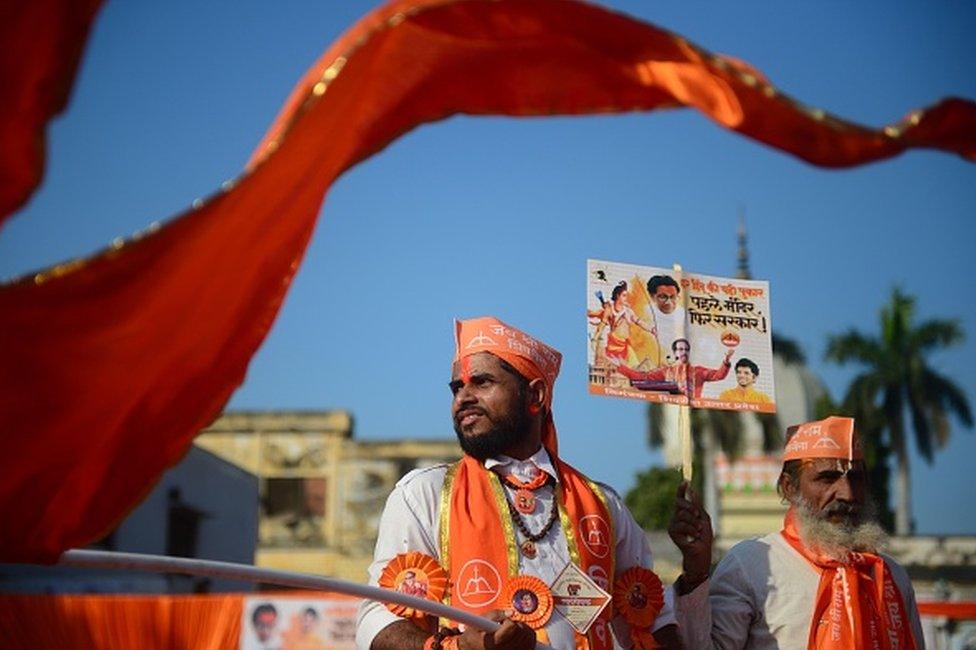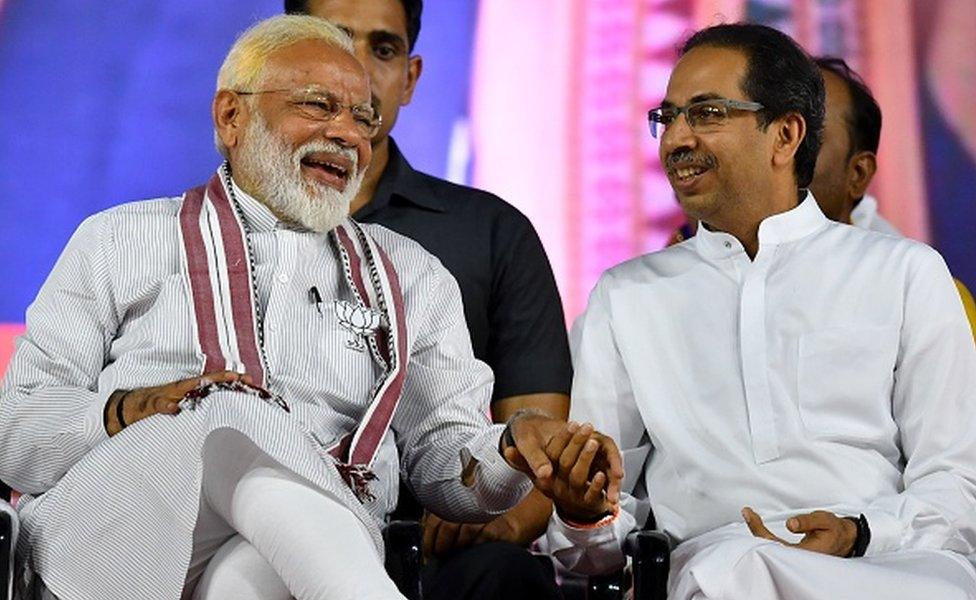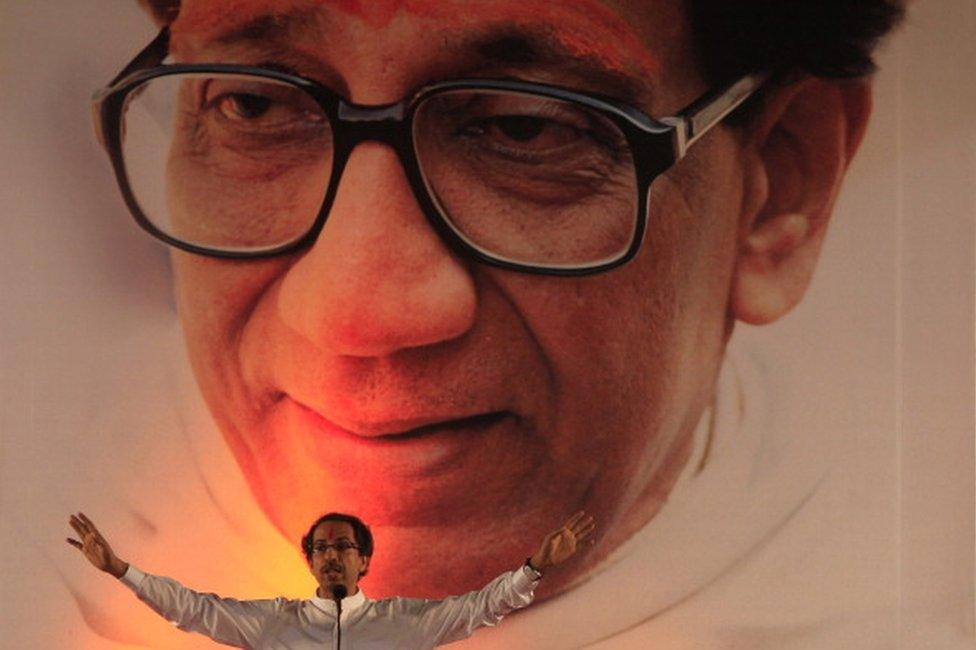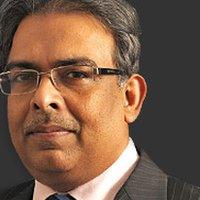Maharashtra: The unravelling of India's BJP and Shiv Sena alliance
- Published

The Shiv Sena is a stridently Hindu right wing party
Politics makes for strange bedfellows. And India's untidy electoral politics sometimes throws up unusual, unintended consequences.
Consider the recent elections in Maharashtra, the country's richest state.
Narendra Modi's Hindu nationalist BJP emerged as the single largest party, winning 105 of the 288 seats in the state assembly. Its long-time ally and ideological bedfellow, Shiva Sena, got 56 seats.
The two parties have been allies for nearly three decades, and a coalition government looked like a foregone conclusion. The two main opposition parties - the regional Nationalist Congress Party (NCP) with 55 seats and the enfeebled Congress which only won 44 seats - lagged way behind.
But the Sena, the junior partner, had other ideas. It demanded it should share the chief minister's position with the BJP on a rotational basis. The BJP, which also rules India, flatly refused. After a few excruciating rounds of talks between the two sides, the Sena pulled its single minister out of the federal cabinet. With no government in sight, the governor of Maharashtra imposed direct federal rule.
Now the Sena has turned to the Congress and NCP to try to stitch up a governing alliance. Such a government would easily confound political pundits.
Consider this. The 53-year-old Shiv Sena is a stridently right-wing Hindu party. It began as an ethnic, nativist outfit to support the interests of Mumbai's Marathi-speaking people. After the erosion of its original vote bank, it positioned itself as a party which represented Hindu interests, and its base has been traditionally anti-Congress.

The party's mercurial founder Bal Thackeray, who died in 2012, was blamed for inciting tensions between Hindu and Muslim communities during the 1993 Mumbai riots in which about 900 people died. Over the years, the party has skilfully travelled from what political scientist Suhas Palshikar calls a "regional identity to a communal identity".
So, how would self-professed secular parties like the Congress and the regional NCP, a declining rump party led by a powerful regional leader, join hands with the Sena and rule? "It would be actually suicidal for the Sena to join hands with Congress and NCP to form a government," says Girish Kuber, editor of Loksatta, a leading Marathi newspaper.
Indian politics is more ideological than many believe, but most parties have proved to be masters of realpolitik in pursuit of power. Unlikely alliances have been forged as quickly as they have fallen apart.
A relatively recent example was a stressful alliance between the BJP and the separatist regional PDP in Indian-administered Kashmir which fell apart in 2018 amid much acrimony. Bal Thackeray's son, Uddhav, who now runs Shiv Sena, has remarked how the BJP has forged "alliances with non-ideological parties" like PDP, Janata Dal United in Bihar, and the Telugu Desam Party in Andhra Pradesh.
"Without ideological congruence, alliances usually don't last for long. The only way an alliance between the Sena and Congress will work is if the former eschews its violent politics and does some soul searching," Rahul Verma, co-author of Ideology and Identity: The Changing Party Systems of India, told me.
This is highly unlikely. So why did Sena play a game of political brinkmanship for a larger share of power with a more powerful ally like the BJP?
One possible reason is that, like most of India's regional parties, it feels threatened by the BJP's untrammelled ascendancy. Many pundits have described this as the beginning of India's "second dominant party system", external, the first being the earlier dominance of the Congress. In a crushing second term victory this summer, the BJP picked up 37% of the popular vote and an increased majority of seats in parliament. Along with its allies, it currently rules in 18 of the 29 state assemblies. With 180 million "members", it has also become the world's largest political party.

Shiv Sena chief Uddhav Thackeray's father Bal Thackeray (background) was a mercurial leader
The Sena's urban right-wing politics has been largely eclipsed by the BJP's muscular pan-Indian Hindu nationalism. Back in the day, Mr Thackeray was called the "Emperor of Hindu Hearts" by his supporters. Mr Modi has taken over that mantle. "The hegemony of the BJP makes smaller parties fearful, and they fear they will be swallowed by it," says Mr Kuber.
Given the widespread fear of the expansionist BJP, could the strangest of bedfellows still come together and form a government in Maharashtra? Whether such a scrappy coalition would survive for long is a moot point.

Read more from Soutik Biswas

